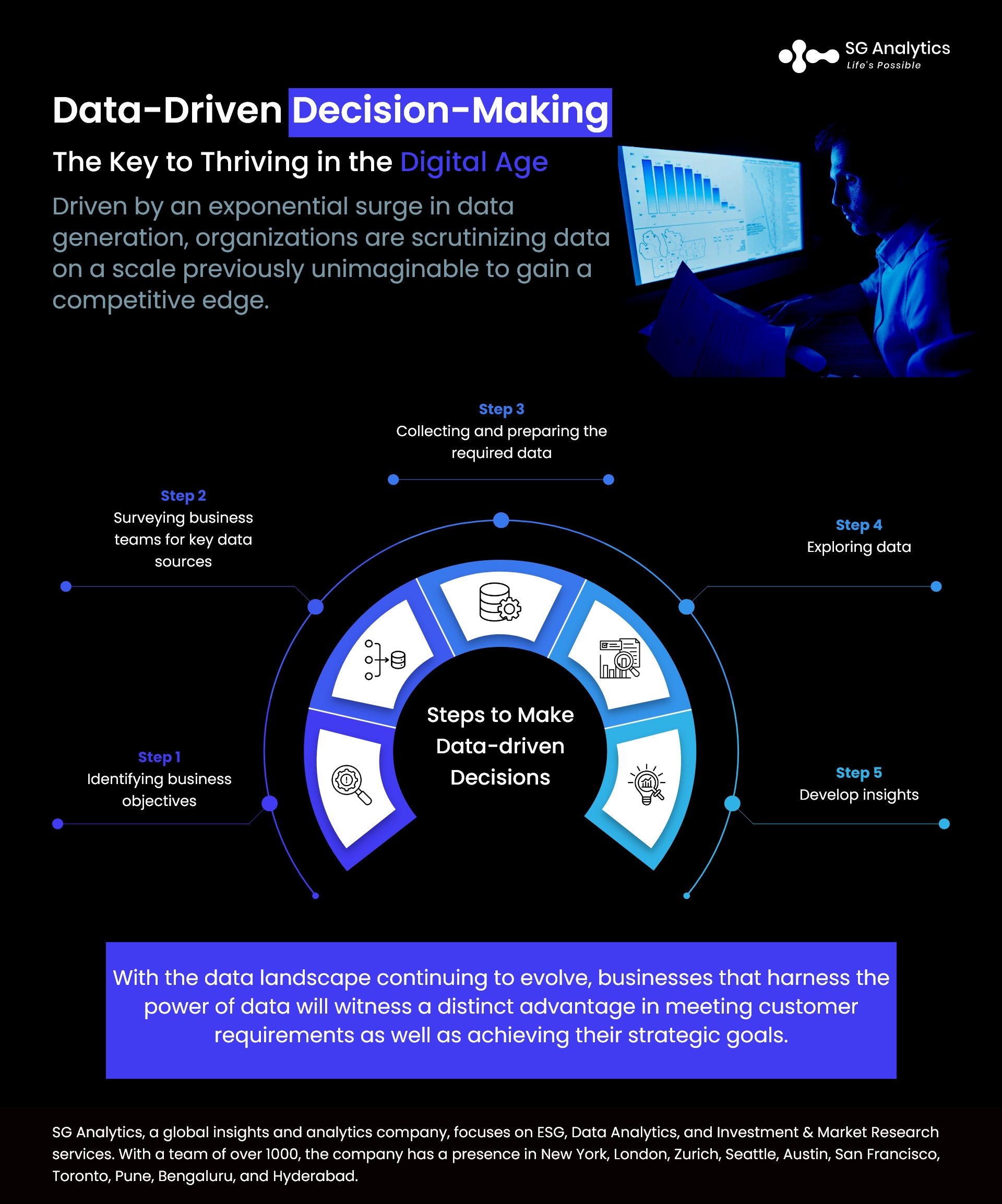In today's digital world, data is viewed as a critical asset for businesses across industries. Organizations have access to an unprecedented amount of data on their customers, products, and operations. This wealth of data has given rise to a new paradigm in decision-making - data-driven product decision-making.
The Power of Data-Driven Decision Making
The growing importance of data-driven decision-making across product development is emerging as a key component of the analytics landscape. Data-driven decision-making implies using facts, metrics, and data to navigate strategic business insights that align with the organizational goals, objectives, and initiatives. It involves collecting, analyzing, and interpreting information to discover insights into customer behavior, market trends, and product performance.
Organizations are realizing their data's full value and integrating frameworks to make better decisions with data daily. However, organizations need to make data-driven decision-making the norm by cultivating a culture that fosters critical thinking and curiosity. Establishing these core capabilities will help promote data-driven decision-making across all levels and further investigate information to uncover critical insights that drive action.
Read more: Authenticity Over Greenwashing: How Brands Are Engaging with Customers and Building Trust?
Nurturing a Data-Driven Culture for Business Growth
Embracing a data-driven culture is key to progress for every organization. A data-driven culture focuses on boosting the efficiency of data operations as well as strategic planning by reducing any errors that could increase costs. In addition, it boosts overall growth by enhancing collaboration and communication, giving more power to employees, and cultivating a mindset of constant enhancement. Data-driven insights help identify new ideas and hidden trends, thus creating a path for developing innovative products.
In essence, adopting a data-driven culture is a necessity for businesses to thrive in the ever-growing competitive landscape. A data-driven culture not only facilitates business growth but also presents invaluable insights to uncover new opportunities. Such culture helps prove important in addressing challenges and navigating crises.
A data-driven culture focuses on business agility, innovation, and operational efficiency. This integration of a data-driven ethos is a strategic imperative for organizations toward sustained growth and resilience. By adapting to market changes and anticipating challenges, organizations can further mitigate the risk of errors and enhance confidence in their actions.
Read more: A Critical Overview of Big Data and Bigger Dilemmas for Enterprises

Steps to Make Data-driven Decisions
To foster a data-driven culture, organizations can integrate the following steps to find and use their data effectively.
Step 1: Identifying business objectives
This step involves understanding the organization’s executive and downstream goals. This involves identifying increasing sales numbers and website traffic or as ambiguous as increasing brand awareness. This will later assist with key performance indicators (KPIs) and metrics that are influential for decision-making. They help determine which data to analyze and what queries to ask for analyzing key business objectives.
Step 2: Surveying business teams for key data sources
To ensure growth, it is critical for the organization to gain input from people to set short and long-term goals. These inputs further help in making informed analyses based on data collected from certified data sources. Valuable inputs from across the organization help guide analytics deployment and future state and success measurements to identify progress.
Step 3: Collecting and preparing the required data
Accessing quality and trusted data can be a big hurdle for business if the accumulated information is from many disconnected sources. Once they have an idea of the breadth of data sources, they can start by preparing data with high impact and low complexity. Prioritizing data sources with the biggest audiences can further help make an immediate impact.
Read more: Savings Squeeze: A Looming Threat on the Economic Landscape
Step 4: Exploring data
Visualizing the data is crucial for data-driven decision-making. Representing the derived insights in a visually impactful way offers a better chance of influencing the decisions of senior leadership. With many visual elements like charts and graphs, data visualization presents an accessible way to understand trends and patterns in data.
Step 5: Develop insights
Critical thinking with data indicates finding insights and communicating them in an engaging way. Visual analytics is an intuitive approach to answering questions about the collected data. It further helps in discovering opportunities or risks that impact success or problem-solving. Embracing a modern analytics solution for decision-making is important to gain a comprehensive view of the customer’s journey as well as to review line-of-business relationships.

Harnessing the Power of Data-Driven Culture
Data is the new currency of today's modern world, and organizations are adopting a data-centric ethos to gain a competitive edge. Driven by an exponential surge in data generation, organizations are scrutinizing data on a scale previously unimaginable.
In data-centric companies, data empowers leaders to make decisions that transform their organizational operations. A data-driven culture fosters an environment that values information, ensuring its accessibility and utilization for decision-making purposes. In this culture, data is not only collected but also analyzed, interpreted, and integrated across all company processes. It helps prioritize widespread data literacy and maturity and embrace data-driven insights as the standard rather than the exception.
The adoption of data-driven cultures involves integrating paradigms and data science methodologies into decision-making processes, thus bringing value to organizations. These breakthroughs are simplifying the process of interpreting and storing data, enabling organizations to integrate strategic decision-making to drive business growth.
Read more: Top 5 Data Analytics Companies Transforming Business
The Future of Data-Driven World
In today's digital age, the infusion of data across every facet of business operations is reshaping strategies, decision-making, and operations. This widespread adoption of data-driven practices is predicted across all sectors.
A data-driven decision-making framework plays a pivotal role in societal progress. Embracing this transformative shift is imperative for organizations to attain a substantial competitive advantage while also contributing to a more streamlined and transparent world. However, navigating this landscape can be challenging as businesses need to take several critical steps to ensure they are making the most of their data for product decision-making.

A fundamental framework for businesses in the digital age, navigating the data-driven analytics landscape effectively can further help them gain valuable insights, improve their products, and stay competitive in rapidly evolving markets. Businesses need to understand the components of the analytics landscape to leverage data for product decision-making effectively.
With the data landscape continuing to evolve, businesses that harness the power of data will witness a distinct advantage in meeting customer requirements as well as achieving their strategic goals.
SG Analytics, recognized by the Financial Times as one of APAC's fastest-growing firms, is a prominent insights and analytics company specializing in data-centric research and contextual analytics. Operating globally across the US, UK, Poland, Switzerland, and India, we expertly guide data from inception to transform it into invaluable insights using our knowledge-driven ecosystem, results-focused solutions, and advanced technology platform. Our distinguished clientele, including Fortune 500 giants, attests to our mastery of harnessing data with purpose, merging content and context to overcome business challenges. With our Brand Promise of "Life's Possible," we consistently deliver enduring value, ensuring the utmost client delight.
A leading enterprise in Data Solutions, SG Analytics focuses on integrating a data-driven decision framework and offers in-depth domain knowledge of the underlying data with expertise in technology, data analytics, and automation. Contact us today to make critical data-driven decisions, prompting accelerated business expansion and breakthrough performance.
About SG Analytics
SG Analytics (SGA) is a global data solutions firm that harnesses data with purpose across the data value chain - from origination, aggregation, management, modernization, and analytics to insights generation to create powerful business outcomes for its customers. Through its research and data analytics consulting services, SGA marries content with context to provide bespoke solutions to its customers, enabling them to improve efficiency, scale, and grow. The company has a presence in New York, London, Zurich, Seattle, Austin, San Francisco, Toronto, Pune, Bangalore, Hyderabad and Wroclaw. The firm serves customers across the banking, financial services and insurance (BFSI), technology, media and entertainment (M&E), and healthcare sectors, amongst others, including Fortune 500 companies.
Apart from being recognized by reputed firms such as Analytics India Magazine, Everest Group, and ISG, SG Analytics has been recently awarded as the top ESG consultancy of the year 2022 and Idea Awards 2023 by Entrepreneur India in the “Best Use of Data” category.









